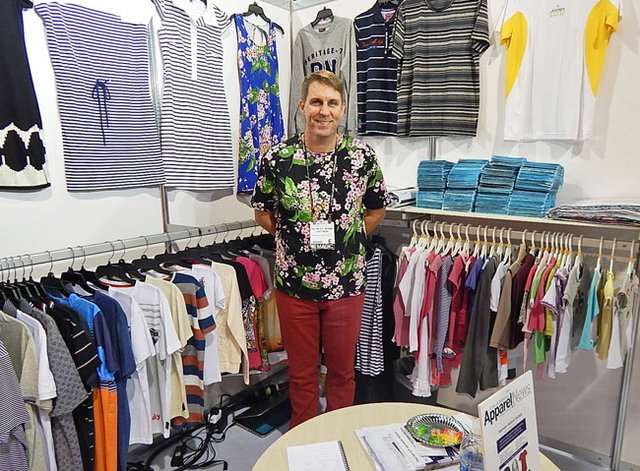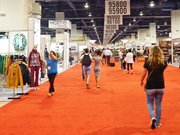New Sources at Sourcing at MAGIC
Trade Shows
MADE IN VIETNAM: Chris Walker is the marketing manager for Thai Son, a knitwear company owned by his parents-in-law in Vietnam.
As of Thursday, August 28, 2014
Walking into Sourcing at MAGIC at the Las Vegas Convention Center is a little bit like taking a trip to the United Nations. It seems that just about every region or country in the world has sent a group of apparel or shoe manufacturers in search of new business.
At the recent edition, held Aug. 17–20, exhibitor count was up 5 percent to 1,530 compared with one year ago.
Rob Chamagua, owner of Wunderwear Mills Inc.,with offices in New York and Florida and a factory in El Salvador, attended the show with the help of Proesa, a government group in El Salvador that promotes exports and investment in the Central American country. Proesa paid for Chamagua’s booth while the apparel maker was responsible for design and decoration of the booth.
His company, which was founded four generations ago in the Bronx, N.Y., but moved its manufacturing to El Salvador in 1993, has 250 workers who make just about anything a client wants.
Currently, Chamagua is manufacturing more yogawear and activewear made from synthetic fabrics. Under the Dominican Republic–Central America Free Trade Agreement, those high-tariff garments enter the United States duty-free if they are made of regional yarns or short-supply fabric.
Chamagua decided to attend the show because he feels more work is coming back to Central America, where orders can be filled from start to finish in 45 to 60 days. “I’ve gotten some good leads but no sales so far,” he summarized about his first two days at the show.
At the Vietnamese pavilion, Chris Walker, whose parents-in-law own Thai Son Knitwear, was busy trying to grab potential customers as they walked down the wide orange-carpeted corridor that split up the various sections of the South Hall.
The company has two factories with 650 workers in and around Ho Chi Minh City, making men’s and women’s garments, ranging from dresses, sportswear and pants to T-shirts and hoodies.
Walker, who has lived in Vietnam for five years after emigrating from the United States, was having a successful show. “I met with the global sourcing strategist for Levi’s,” he said. “I also met two young sourcing agents with Guess.”
Vietnam has grown rapidly as a major apparel producer, being the second-largest supplier of imported apparel to the United States after China. Walker said all sorts of factories are being built in the Southeast Asian country as clothing manufacturers anticipate that Vietnam will be part of the Trans-Pacific Partnership, a new 12-country free-trade agreement that is being negotiated between the United States and other Pacific Rim countries.
The result, Walker said, is that labor costs are rising in Vietnam. His family’s factories pay their workers $200 a month even though the minimum wage is $140 month. “We have to pay a higher wage to keep people,” he said.
Just like sourcing in general, the show was heavily dominated by Chinese factories, which made up nearly 70 percent of the participants. This was the fifth time that Cool Jiang, the general manager for Jiaxing Cooper Garment Factory, attended the show. About 60 percent of the knitwear factory’s clients are in Europe, with another 20 percent in the United States and Canada. The company is trying to expand its U.S. presence.
But he was disappointed he had only seen six buyers in two days. “In the past, the show has been better,” he said.
The “Made in USA” section of the show had about 30 booths. One of those was Made-Well-LA, a full-package, private-label apparel manufacturer that has design, development and production services based in Los Angeles.
This was the 2-year-old company’s first time at the sourcing show. “We have had a great response,” said Mike Basteguian, the enterprise’s owner and president. “I have met people from Texas, Florida, San Diego, northern California, Atlanta and New York. They are people who have been manufacturing in China and want to bring things back here.”

